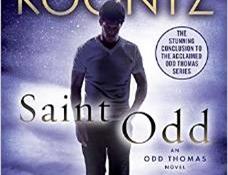Ozzie Boone said that any talent—whether to write songs or to write novels or to track people by psychic magnetism—came with the obligation to use it to the fullest of one’s ability, with a fierce commitment barely distinguishable from neurotic obsession. A writer, he believed, had to stretch with every book, to explore kinds of stories that he’d never told before, to employ narrative techniques that tested the limits of his gift.
In fact, he said, commitment to the point of obsession wasn’t merely an obligation but a necessity, the sine qua non without which the novelist might as well bite on a shotgun barrel and exit this life as Hemingway had done.
Author Dean Koontz is describing himself as much as anyone else in the passage above. Since the time of his beginnings as a writer of very pedestrian thrillers, he has found his voice and exercised it in a multitude of transpositions, drawing on his Roman Catholic faith to lend depth and substance to fantasies of many varieties. Sometimes he succeeds and sometimes he fails, but he’s never dull. And of all his achievements, the continuing character of Odd Thomas is probably the greatest.
Koontz has never made a secret of it. The Odd Thomas books are a cycle, and the cycle had to swing around in time to end where it began.
Where it began and will end is the fictional town of Pico Mundo California, where Odd, perhaps the most endearing action hero in the history of fiction, first discovered his gift for speaking to the dead, and lost the love of his life, the girl with whom (he is certain) he is destined to be forever.
In Saint Odd, the final book of the series, Odd is coming home after years of wandering and strange adventures, drawn by nightmares. His dreams tell him that a horrible mass murder is coming in Pico Mundo, to be carried out by a bloodthirsty cult group with which he has tangled before.
He’s not alone. He has the old Pico Mundo friends we’ve missed—Ozzie Boone the novelist and Wyatt Porter the sheriff—as well as some new friends he’s made in his travels, people who fight against the same bloody cult.
But he’s troubled. Certainly not by the prospect of death, and not so much by the powerful enemies he knows he’ll be facing. He’s troubled by what he sees as changes in himself. When he looks in the mirror, he no longer sees the genial, polite fry cook he used to be. He sees a warrior, a man who has learned to use a gun (he hates guns), and who has killed. To protect the innocent, of course. But he’s too sensitive a soul to be at peace with that.
But it will all be over soon.
If you’ve read the novels (and for heaven’s sake, if you haven’t read them, don’t start with this one. Start with Odd Thomas, and read them in order), you know what I mean. We all knew it was coming. There is no surprise in it.
But be comforted. All is well. All will be well.
If you’re a strong Protestant, you may be troubled by some fairly obvious Catholic ideas in certain story elements. I’m a strong Protestant myself, but I’ll forgive them, because this is Odd Thomas, and there’s nobody like him.
Highly recommended.
Excuse me now. There’s something in my eye…
Lars Walker is the author of several fantasy novels, the latest of which is Death’s Doors.

